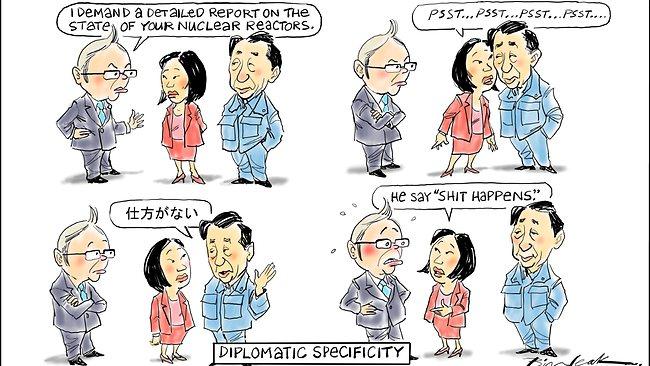Peter Van Onselen
West's shameful go-slow will have bloody results

SHAME is a word hurled across the chamber of parliament houses across the globe, often for the most insignificant reasons. But it is the only word suitable to describe the international community's slow movement towards imposing a no-fly zone in Libya.
Even though the 22-member Arab League voted in favour of doing so on Monday, with only Syria and Algeria voting against it, it took until yesterday for the UN Security Council to approve it.
By taking too long to get its act together and curtail Muammar Gaddafi's use of war planes to bomb civilian strongholds, the international community has weakened the rebellion and lurched Libya towards a situation where more than a no-fly zone will be required to help the rebel uprising succeed or even simply to prevent further loss of life.
Indeed it may already be too late. As Gaddafi's son Saif al-Islam has said: "Military operations are over. Within 48 hours everything will be finished. Our forces are almost in Benghazi. Whatever the decision [regarding the no-fly zone] it will be too late."
That's why the UN resolution included "all necessary measures" to impose the no-fly zone, to protect civilian enclaves and enforce a ceasefire. But Western backslapping about yesterday's developments is inappropriate.
Just weeks ago Gaddafi was holed up in the capital of Tripoli, under siege from the relentless march west by rebel militias. The eastern parts of the country were secure and political leaders, including our own Kevin Rudd, thought it would be only a matter of time before the move towards democracy would unseat a third Middle Eastern dictator.
Administrative steps had been taken by the rebels to establish an alternative government, and foreign diplomats once loyal to Gaddafi were defecting by the dozen.
Had a no-fly zone been imposed then it is highly unlikely Gaddafi would have been able to mount a counterattack that has seen him reclaim most of the country. In all likelihood his days would have been numbered.
Gaddafi still had his planes, ships and tanks, and a mercenary army to use them on civilian targets. Gaddafi's continuing ability to control the military was a key difference with Tunisia and Egypt. In the absence of a no-fly zone these have proved to be an insurmountable advantage.
The mantra of the rebels has been all along that they don't want foreign troops on the ground because that may undermine the nationalist push against Gaddafi, feeding his propaganda that the rebels are a force for Western imperialism.
Yesterday's UN Security Council resolution specifically ruled out an occupying force in part for this reason. However, that now may be the only way to help the rebels do more than survive in their weakened position.
Opposition forces have always known they were technologically out-gunned and vulnerable without a no-fly zone, which is why they repeatedly called for such assistance from the international community.
If the international community still seeks an outcome that gives rebels the best chance to overthrow Gaddafi, yesterday's resolution won't be enough. Having troops on the ground, with all the difficulties that entails, would almost certainly be required.
But with the US fighting a war on two fronts - in Iraq and Afghanistan - it is unlikely that will happen. Not to mention the difficulty of convincing powers such as China and Russia to support such a resolution (both abstained on yesterday's vote and would likely use their veto power to block ground troops as a UN-sanctioned initiative).
In all probability Gaddafi will survive, perhaps with a divided country and a protracted civil war in the east of Libya. Many of his citizens won't.
The nature of what has been agreed to in the UN resolution shows how much the dynamics in Libya have changed. The main aim of the UN now is to prevent further civilian deaths rather than to give the rebels a fighting chance of taking over the country and imposing democracy.
The most depressing thing about witnessing the slow slide into failure by the rebel forces isn't that the likes of The Australian's Middle East correspondent, John Lyons, saw it coming a fortnight ago. Or that many of the best and brightest from the uprising have already fled the country, weakening the chances of a reversal of fortunes in the conflict. It's not even that democratisation in the Middle East could fade away, leaving millions oppressed indefinitely.
It is that many more Libyans will eventually die if Gaddafi regains control of the country or if a protracted civil war ensues.
Tens of thousands of Libyans, if not many more, will lose their lives once Gaddafi gets the chance to purge the countryside of his opponents because the rest of the world sat idly by for too long.
He has said he will show "no mercy" to rebels in Benghazi if they do not lay down their arms, and the reality of what he will do is likely to make his rhetoric look timid. The irony of the relatively easy unseating of Zine El-Abidine Ben Ali in Tunisia and Hosni Mubarak in Egypt is that they were two of the more benign dictators in the region. Meanwhile, whether it is the royal family in Bahrain or Iran's Mahmoud Ahmadinejad, the region's more brutal dictators look set to survive after repelling uprisings.
The message out of the Middle East in the past month is simple: if you are a dictator under pressure, don't be afraid to use force because outgunned rebels won't get the tangible support that should flow from strong Western rhetoric.
And international institutions such as the UN - compelling entities in theory - are weak and ineffectual in practice, taking too long to do what is right.
Watch Australian Agenda on Sunday on Sky News, live at 8.30am, replayed at 12.30pm and 8.30pm, as Peter van Onselen and Paul Kelly interview the Prime Minister, Julia Gillard.


